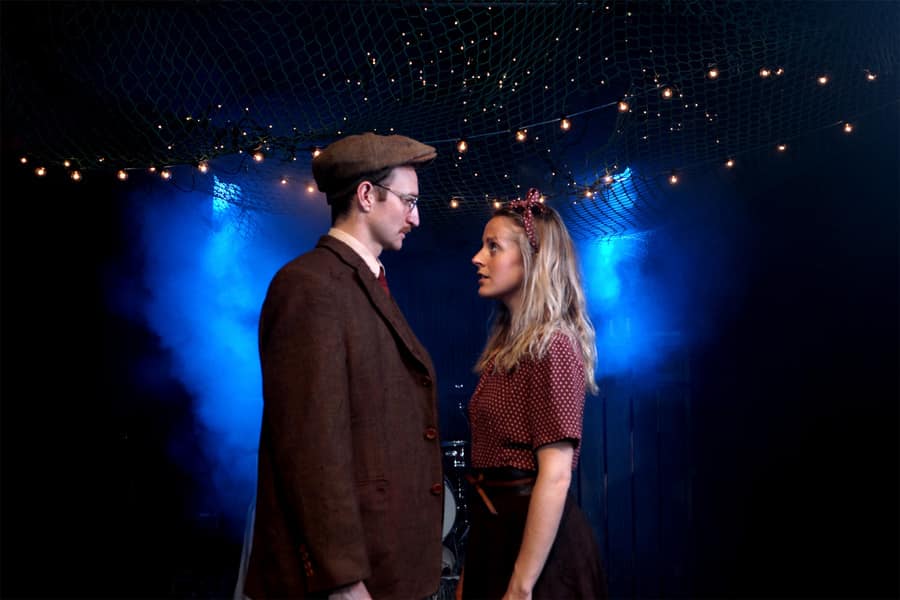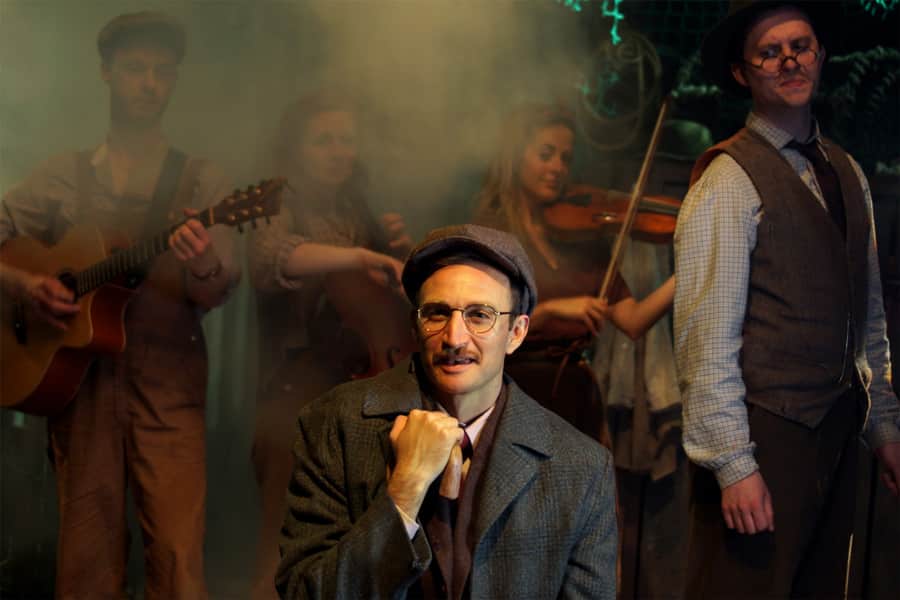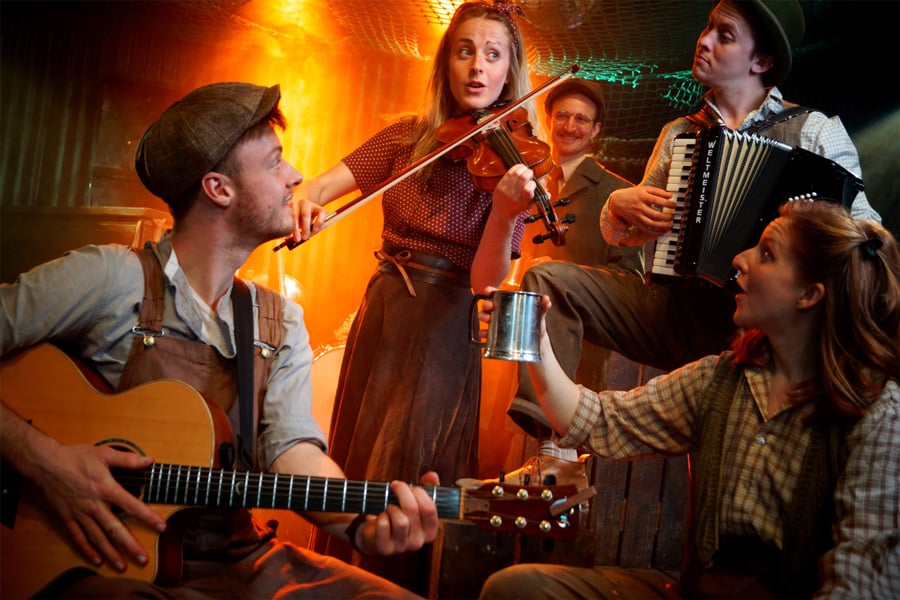NEWS TICKER
REVIEW: The Curious Case Of Benjamin Button, Southwark Playhouse ✭✭✭
Published on
May 20, 2019
By
julianeaves
Julian Eaves reviews The Curious Case Of Benjamin Button now playing at Southwark Playhouse.

James Marlowe and Philippa Hogg in The Curious Case Of Benjamin Button. The Curious Case of Benjamin Button Southwark Playhouse,
Friday 17th May 2019
3 Stars
Book Tickets
This is a handsome production, which scores well in every department except one: the script. Based on an obscure (and deservedly forgotten?) surrealistic short story by F Scott Fitzgerald, this takes us a long way out of his customary cocktails-and-narcissists territory and plunges us into a bizarre world where the central character is born an old man of 70 and then ages backwards getting rapidly younger, scene by scene. From time to time, we do get theatrical representations of contrary time flow and they never seem to work, nor does this one. To compound its dramaturgical difficulties, the central 'thrust' of the plot, if it can be called one, seems to be to represent the steady progress of time, running through the lives of ordinary people, about whom nothing of consequence can be said or thought. Apart from the fact, naturally, that one of them - for reasons which the writer never satisfactorily explains (an attempt is made by the ensemble to say that it has something to do with the 'tides' running backwards) - just happens to live his life the wrong way round.
In a kind of twee, twice-told-tales kind of way, the story has a certain faux naif charm in its arch metaphor of the meaning of life. The producing artistic director, director, adapter and lyricist, and also the founder and leading light of this company, Jethro Compton Productions, evidently thinks there is all of that in it, and so much more, easily sufficient to sustain interest for two and a half hours in the theatre. But I'm not quite as convinced.

James Marlowe and the Company
I guess it may all depend on what you think theatre is for. The production standards of this show are really exemplary. It has a magnificent set - in this tiny space, The Little - designed and lit sumptuously by the hugely gifted eye of Schoenlatern. There are convincingly period costumes by Cecilia Trono (yes, this is another nostalgia-fest, with much poor-and-simple-but-the-salt-of-the-earth-types dutifully obeying the deferential conventions of the first half of the 20th century). And there is vividly robust movement from Chi-San Howard, whose stamping, thumping gestures combined with the boldly straightforward story-telling style of the direction make one think that if Shared Experience and 'Stomp!' ever collaborated on a musical play, then THIS is what they would produce! Michael Woods floods the space with crashing Cornish waves and mournfully tolling bells.
All this is lovely, but none of it prepares us for the real star of the show: the score by musical director, deviser and arranger, Darren Clark. This is a bold step forward for Clark, where the musical elements are much more closely interwoven and intimately wedded to the dramatic action than I have hitherto experienced in his work: and therein lies the blessing and the curse of what he has done. The musical idiom here is - as we have come to expect in his work - folk song. However, unlike all of his other work that I have seen, this piece does not have much in the way of strongly engaging dramatic events. Oh, there are 'incidents', which shuffle across the stage like a biographical soap-opera, but very few of these ever come into sharp enough focus for us - we, the audience - to care much about their outcome, one way or another.

The Company of The Curious Case Of Benjamin Button
And the reason for that indifference is, as said above, the script. Too much of the energies of the book appear to go into 'telling' us about stuff, rather than 'showing' us how and why it happens. The multiple narrations given to the cast, as they assume and cast off part after part, romping through an immensely populous yarn of a somebody who was really a nobody seem to suffocate the drama under the weight of their own exposition. Only one scene, really, in the depths of the second act, properly comes to life on stage: the actors who get to play it must relish it since it is the only moment the book offers them to do what they do best - act. The rest of the time, they are just 'story-tellers', burdened with having to trudge uninspiredly through page after page of 'he said' and 'she said'.
Secondly, the very modesty of the ambition of the drama ('a show about moments' in the words of Clark) strikes me as being at odds with its chosen musical vernacular. The folk idiom is dominated by strongly narrative, emotive directness that is totally unsuited to the elliptical, subtle shades that the book sounds as if it is trying to reach. The decision to avoid interruptions in the unfolding of the tale again points the finger away from ballad-opera and towards, well, something more like, 'Pelleas et Melisande'. There are some well integrated musical interludes, but the bulk of the score gives us a string of tunes played and sung by the five actor-musicians that could easily have a polite smattering of applause to show our appreciation of them, before slipping out to order more drinks from the bar.
As for the cast themselves, they give it all they've got doing everything that is expected of them. Working tirelessly through the 150 minutes or so of the performance, they sing, dance, play, say their lines and move the boxes and drawers of the scenery with unrelenting energy. Matthew Burns, Rosalind Ford, Joey Hickman, Philippa Hogg and James Marlowe do everything that the script asks of them, and they can do no more. It is not their fault that the book compels them to walk through a minefield of cliches and the most predictable turns and twists in what should be anything but a dull plod. They are forced at all times to inhabit a realistic world in which the only interesting plot event is completely unrealistic and so never, really, belongs, either to them or anyone else. The musical score by Darren Clark ensures that the experience goes by pleasantly enough, but the script doesn't ever give him the opportunities for 'bite' that so energised works like 'These Trees Are Made Of Blood'. Technically, this work is more sophisticated; artistically, it's rather disappointing.
BOOK TICKETS FOR THE CURIOUS CASE OF BENJAMIN BUTTON
© BRITISHTHEATRE.COM 1999-2024 All Rights Reserved.
The BritishTheatre.com website was created to celebrate the rich and diverse theatrical culture of the United Kingdom. Our mission is to provide the latest UK theatre news, West End reviews, and insights into both regional theatre and London theatre tickets, ensuring enthusiasts can stay up to date with everything from the biggest West End musicals to cutting-edge fringe theatre. We are passionate about encouraging and nurturing the performing arts in all their forms.
The spirit of theatre is alive and thriving, and BritishTheatre.com is at the forefront of delivering timely, authoritative news and information to theatre lovers. Our dedicated team of theatre journalists and critics works tirelessly to cover every production and event, making it easy for you to access the latest reviews and book London theatre tickets for must-see shows.